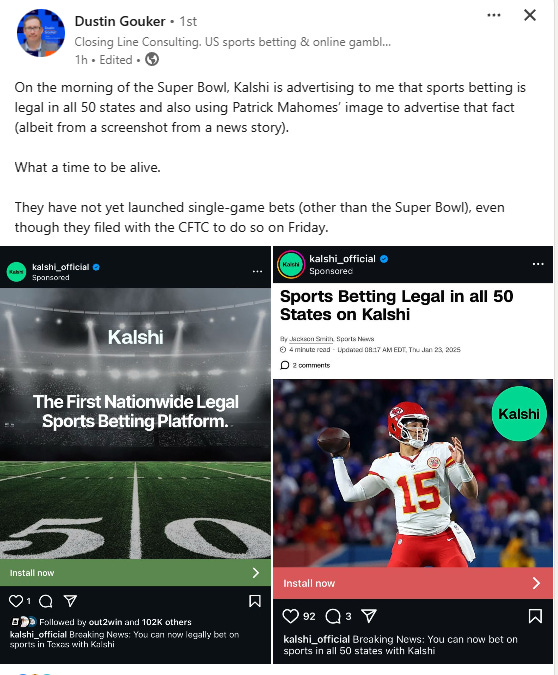Strikes And Gutters; Ups And Downs
Kalshi's entry into sports markets has drawn criticism but it's hoping its newly announced integrity and responsible gambling tools will quell concerns.
The Bulletin Board
THE LEDE: Kalshi does the right (and smart) thing by addressing integrity concerns and launching RG tools.
ROUNDUP: AK sports betting; SC casino bill; MA Secretary of State investigates Robinhood; Publishers Clearing House + social sweeps
NEWS: Sizing up the best contenders for a New York casino license.
AROUND the WATERCOOLER: SPGA called out after blunder.
STRAY THOUGHTS: Never a dull moment.
SPONSOR’S MESSAGE - Yes, Sporttrade is indeed a prediction market. Always has been.
The Lede: Kalshi Gets Out In Front Of Criticisms
Kalshi’s kick-the-door-down entry into the sports betting space (under the banner of sports prediction markets or events contracts) has raised a lot of eyebrows and drawn quite a bit of criticism.
To its credit, the company has begun addressing a couple of areas of concern, including one thread this newsletter has been focused on: Responsible gambling. As an 18+ product that mimics traditional sports betting, the lack of responsible gambling messaging, tools, and policies has been glaring.
“The still yet-to-be-fully-unleashed might of responsible and problem gambling advocates, who may have some qualms about the accessibility of these products and the lack of anything resembling RG/PG guardrails.”
Another area of concern is integrity, with MLB saying in its letter to the CFTC:
“As the resemblance between sports event contracts and traditional sports betting markets continues to grow, so too does the need to replicate the integrity and consumer protections that exist at the state level. Currently, those protections are lacking.
“For example, MLB is not aware of anything that would require exchanges and brokers to notify leagues of potential threats to game integrity, cooperate with league investigations into player, umpire, or employee misconduct, or share data for integrity purposes.
“MLB has been advised that some exchanges and brokers take the position that they are not even permitted to share information with MLB under current CFTC regulations.”
To counter these claims (h/t to Dustin Gouker’s excellent Event Horizon newsletter), Kalshi has partnered with IC360 and will utilize the company’s Prohibet tool (which prevents impermissible bettors from placing wagers/trades) and to monitor suspicious activity as it relates to trading sports events contracts on its platform.
According to Kalshi (via Gouker), the relationship dates back a month.
Kalshi has also launched a"customer protection hub" that features many of the RG tools in place at licensed, regulated sportsbooks, including self-exclusion and deposit and time limits.
This is a great first and second step by Kalshi.
Let’s hope it leads to steps three and four — pulling back on its “sports betting” in 50 states claims (while arguing its not sports betting) and even more robust RG, AML, and KYC protocols.
As I’ve said in the past, I’m not against any of these products; I’m just very much for strong regulations:
“Let me be clear: I am not opposed to any new product or model. Whether it’s a traditional online poker site, a sweepstakes casino, or a prediction market site offering sports contracts, I simply want a safe, regulated environment where the rules are made plain. That means proper AML/KYC, integrity, responsible gaming, and consumer protections are in place, with oversight ensured.”
Roundup: AK Sports Betting; SC Casino Bill; MA SoS Investigates Robinhood; Publishers Clearing House
Sports betting bill introduced in Alaska: (h/t Geoff Zochodne) Alaska beat Hawaii by several months to become the 49th state, and Hawaii beat Alaska by several months in introducing sports betting in 2025. Lawmakers in Alaska have introduced a bill that would authorize mobile sports wagering. There is a limit of ten licenses, with a licensing fee of $100,000 and a tax rate set at 20%.
South Carolina lawmakers introduce a plan to legalize casino gambling: Legislation, H 4176, has been introduced that would make a proposed $1 billion casino project in the town of Santee a reality. The company behind the project, the Santee Development Corporation (SDC), “claims the project would generate 4,600 new jobs in South Carolina while attracting more than 4 million visitors each year and generating more than $75 million in annual tax revenue.” The bill’s sponsor, State Rep. Chris Murphy, also sponsored South Carolina’s current sports betting bill. I don’t expect either effort to go anywhere in notoriously anti-gambling South Carolina.
Massachusetts Secretary of State investigates Robinhood’s entry into sports betting: A huge scoop from Reuters, which is reporting Massachusetts Secretary of State Bill Galvin has opened an investigation into Robinhood’s sports contracts. Galvin called the sports markets a “gimmick from a company that’s very good at gimmicks.” Per Reuters, Galvin has subpoenaed Robinhood, asking for “copies of Robinhood marketing materials and… to identify any and all residents in the state with brokerage accounts with the company who requested to trade college sports events contracts.” Robinhood told Reuters, “The events contracts it offers are regulated by the U.S. Commodity Futures Trading Commission and offered through CFTC-registered entities,” AKA Kalshi.
Sweepstakes pioneer Publishers Clearing House gets into social sweeps: Here are a few words I never expected to write. Per SBC Americas, “Publishers Clearing House (PCH) has announced a deal with global gaming advisory firm SCCG Management… to develop social gaming monetization opportunities using PCH’s consumer database.” The deal gives PCH “access to SCCG’s portfolio of sweepstakes and social gaming operators, allowing the company to monetize its player base of over 170 million users.”
SPONSOR’S MESSAGE: Protect your players and grow your tribal gaming business with GeoComply.
Looking to implement mobile Class II gaming? We go beyond simple compliance, delivering seamless player experiences and ironclad security.
If your casino is going cashless, is someone monitoring the activity on the mobile device while it transfers funds to your casino? That’s what we do. We detect device integrity issues and give you actionable insights to mitigate any AML, OFAC, and CTF risks.
Book a meeting with us at the Indian Gaming Tradeshow & Convention (Booth #2541) and discover how GeoComply will bring you more customers, fight fraud, and protect your revenue.
News: The Top 5 New York Casino Proposals
Downstate New York licenses are expected to be awarded by the end of 2025, with 11 proposals vying for just three licenses.
The city’s two existing racinos, Resorts World at Aqueduct and MGM Empire City Yonkers Raceway, continue to be frontrunners, which would leave just a single license available.
It’s been a long, slow process, but we are starting to see the light at the end of the tunnel. STTP has identified two other solid candidates and a third viable candidate for the final license — with the caveat that anything can happen during this competitive process. I’ll offer up some thoughts on the other proposals in tomorrow’s newsletter.
MGM Empire City (Yonkers): Frontrunner
The proposal: MGM Resorts International aims to expand its existing Yonkers racino into a full-scale casino, leveraging its established infrastructure for a quick transition.
Opposition: Opponents claim expanding the racino would increase gambling addiction risks in a working-class area without delivering substantial new economic gains.
The case for: MGM’s existing racino in Yonkers gives it a significant speed-to-market advantage, requiring only an upgrade to add table games compared to ground-up construction required by other projects. The project faces minimal organized opposition compared to some of the urban proposals.
Resorts World New York City (Queens): Frontrunner
The proposal: The Genting Group seeks to expand its Aqueduct racino into a major casino with 1,600 hotel rooms, a 7,000-seat venue, and potentially 3,000 housing units (the housing is more of a hope than a plan).
Opposition: Locals have expressed fears of heightened crime, traffic, and point to insufficient community input.
The case for: Like Empire City, an operational racino has a significant advantage. Add Genting’s $5 billion expansion plan and bipartisan political support, and the project looks destined for one of the three licenses despite some local concerns about crime and traffic.
Sands New York (Nassau County): Solid Contender
The proposal: Las Vegas Sands’ proposed resort at the Nassau Veterans Memorial Coliseum site includes a casino, hotels, convention space, and a luxury spa, with gaming as just 10% of the project.
Opposition: Nassau residents and officials argue that quality of life would decrease, citing traffic, crime, and the loss of the Coliseum’s community-focused identity. Legal battles with Hofstra University and resident petitions also stand in its way.
The case for: The $5 billion Nassau Coliseum redevelopment has secured a 99-year lease agreement with Nassau County and has county leadership backing. Its suburban location may be more appealing than a Manhattan casino, and Las Vegas Sands’ experience with destination casinos and deep pockets bolsters its case.
Metropolitan Park (Queens): Solid Contender
The proposal: Steve Cohen and Hard Rock International have proposed an $8 billion entertainment complex near Citi Field, including a casino, 25 acres of parkland, and a revamped transit hub.
Opposition: Some Flushing residents and groups argue it would overburden local transit, reduce park access, and benefit wealthy developers rather than the community. Zoning and legislative delays pose risks to the project.
The case for: Backers argue Cohen’s proposal near Citi Field offers significant community benefits. It also has politically powerful backing from Queens Borough President Donovan Richards, and Cohen’s local ties, as the Mets owner, certainly help.
Caesars Palace Times Square (Manhattan): Viable Candidate
The proposal: Caesars Entertainment, SL Green, and Roc Nation have proposed a 250,000-square-foot casino in Times Square with a 950-room hotel and entertainment venue.
Opposition: The Theater Workers’ Union and Broadway League have voiced strong opposition, fearing disruption to Times Square’s cultural fabric. The four Manhattan projects could also “split the vote,” so to speak.
The case for: With Mayor Eric Adams’ support, promises of economic boosts for Broadway, and 17 trade unions in favor, Caesars has the best odds of the four Manhattan proposals.
Around the Watercooler
Social media conversations, rumors, and gossip.
“And bad mistakes, I’ve made a few…”
It appears the “Social & Promotional Games Association (SPGA) issued an unauthorized press release with a quote on sweepstakes that we never provided,” Joseph Martin, the founder and CEO of Kinectify, posted on LinkedIn.
This is one I would have left in the inbox had it not been aired by Martin on LinkedIn. Mistakes happen, and the SPGA’s PR firm, Red Knot Communications, is one of the best I’ve communicated with, both responsive and helpful.
STTP received the press release (I’m sure someone will post it), a retraction within an hour, and an apology a couple of hours later, with Red Knot taking responsibility.
In a statement to STTP, Camilla Wright at Red Knot Communications said:
“Sometimes when things go wrong you've just got to hold up your hand and own that particular snafu. On this occasion, a draft release on behalf of the SPGA was sent out erroneously and prematurely, thanks to a simple human error in the communications team.
“For background, the SPGA had reached out to the world-class leader in this field, Kinectify, to provide guidance for the upcoming guidebook on AML best practice that the assocation is producing for its members. The SPGA is immensely grateful for the guidance provided by Kinectify, which will enable SPGA members to continue to commit to the industry's highest standards for financial integrity,
“Red Knot have spoken privately with Kinectify, who I think now realise the SPGA were not trying to blindside them with this release, so we hope.
“This incident does not detract from the fact that Kinectify's leadership in promoting AML best-practice right across the gaming industry will ensure that the millions of American adults who enjoy playing sweepstakes games can be confident that they can expect the highest standards of consumer protection.”
ICYMI, STTP had two members of the Kinectify team on the podcast in September to chat about compliance, AML, and more.
Stray Thoughts
Can we get one slow news day? Just one?
Also, two Big Lebowski titles from the newsletter within a week!









